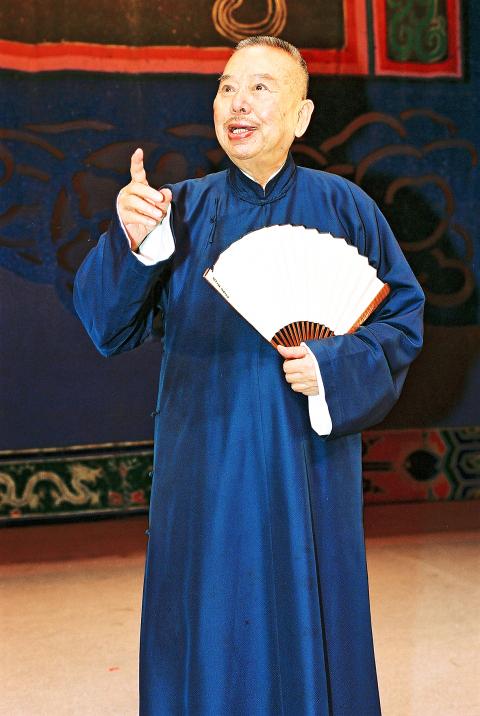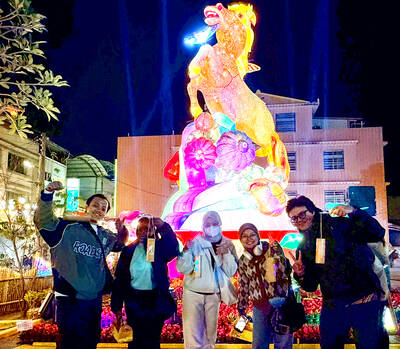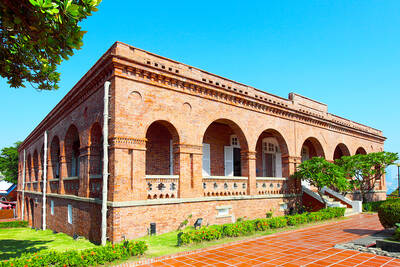The apprentices of Wu Zhao-nan are holding a ceremony tomorrow in memory of the late legendary crosstalk performer. Wu died of multiple organ failure at home in Los Angeles, the US on Oct. 14 at the age of 92. The ceremony is set to take place at Taipei Zhongshan Hall’s Zhongzheng Auditorium at 10pm tomorrow, and all fans are welcome to pay their final respects to the master.
After relocating from China to Taiwan, Wu started to do Chinese crosstalk, which is a traditional comic dialogue, with his partners Wei Long-hao and Chen Yi-an in the 1950s. He became widely-known after releasing the nation’s first crosstalk record with Wei in the 1960s. Wu won numerous awards during his extraordinary career and was formally named a “living national treasure” by the government.
The versatile artist even developed the famous Taiwanese dish “Mongolian barbecue” when he opened an eatery many years ago, and today this Taiwanese dish has become popular throughout the world.

Photo: CNA
照片︰中央社
(Eddy Chang, Taipei Times)
傳奇相聲大師吳兆南辭世後,他的徒弟們將於明日為他舉行紀念追思會。他因多重器官衰竭,稍早十月十四日於美國洛杉磯家中過世,享壽九十二歲。追思會預計於明早十點在台北市中山堂中正廳舉辦,並歡迎粉絲們前來向大師致上最後的敬意。
吳兆南從中國搬遷至台灣以後,自一九五○年代起和搭檔魏龍豪、陳逸安表演中式相聲,也就是傳統喜劇對話,之後他與魏龍豪在一九六○年代推出台灣首張相聲唱片而聲名遠播。在精彩的演藝生涯中獲獎無數,更被政府正式認定為「人間國寶」。
這位多才多藝的藝人當年開小吃店時,甚至還創造出「蒙古烤肉」這種知名的台式料理,如今這道台灣美食在世界各地都相當受歡迎。
(台北時報張聖恩〉

A: Harvard professor Robert Waldinger’s “7-day Happiness Challenge” includes: Day 1: Take stock of your relationships; Day 2: The secret power of an 8-minute phone call; Day 3: Small talk with strangers has big benefits. B: That’s not too hard. What’s next? A: Day 4: Why you should write a “living eulogy;” Day 5: The importance of making work friends; Day 6: Don’t cancel those social plans. B: Good ideas. What’s the final challenge? A: Day 7: Keep happiness going all year long. So, I’m inviting some friends to the Taipei Lantern Festival today to build good relationships. Wanna

A: Happy Lunar New Year. I wish you joy and health in the Year of the Horse. B: Thanks, you too. Actually, the Harvard Study of Adult Development claims that they’ve finally discovered the secret to living a happy life after 85 years of research. A: What is it? Money? Fame? Career? B: Nope, the key is good relationships. Professor Robert Waldinger, the principal investigator, portrays one’s relationships as “social fitness,” and has worked with the New York Times to launch the “7-day Happiness Challenge.” A: I wanna be socially fit. How can I participate in this challenge? A:

★ 本文由生成式 AI 協作,本刊編輯編修。 For tourists looking for a scenic way to spend an afternoon in Kaohsiung, heading to the British Consular Residence of Takao is the perfect choice. Its elevated position allows one to take in the bustling Kaohsiung Harbor to the east and the dazzling sunset over Sizihwan Bay to the west. This elegant red-brick building also serves as a portal to the city’s rich history. Interestingly, for 70 years, many people mistakenly identified this residence as the actual consulate. The history of “Takao,” the former name of Kaohsiung, began its international chapter in the mid-19th century. As European powers

★ 本文由生成式 AI 協作,本刊編輯編修。 Continued from yesterday(延續自昨日) https://www.taipeitimes.com/News/lang Kaohsiung’s deep connection with the sea continues to thrive, with Kaohsiung Harbor remaining a crucial hub for global shipping. In addition to the port, the city has emerged as a major player in another world-class maritime industry—yacht manufacturing, responsible for producing 80 percent of all Taiwan-made yachts. The yacht industry in Taiwan originated in the post-World War II era, when the US military presence in Taiwan provided local boat builders with guidance on making wooden yachts. The resulting craftsmanship was so exquisite that orders soon poured in. In 1977, Taiwan replaced Canada as the main yacht